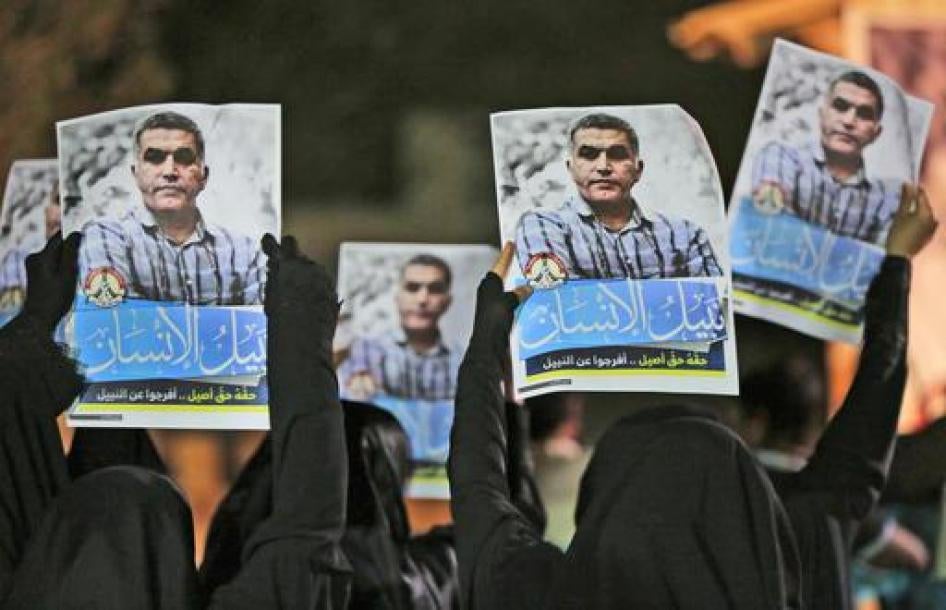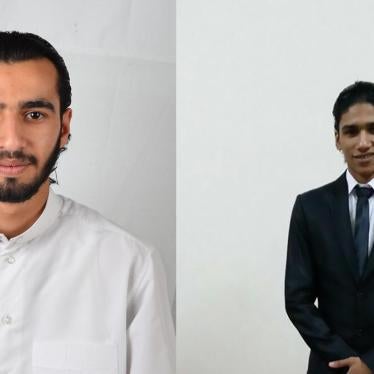(Beirut) – Participants in the ‘Peace to Prosperity’ workshop on June 25 and 26 in Manama, and journalists covering the event, should question Bahraini officials about the government’s jailing of human rights defenders and suppression of free expression, Human Rights Watch said today. The Trump administration organized the economic workshop as part of its Middle East peace plan.
“In a bitter twist of irony, Bahrain, which regularly stamps out dissent with arbitrary detention, censorship, and torture, has been selected to host a workshop on peace to prosperity,” said Lama Fakih, acting Middle East director at Human Rights Watch. “Journalists attending the workshop should press the Bahraini government on rights abuses at home.”
Independent and foreign journalists rarely have access to Bahrain, and Human Rights Watch and other international rights groups are routinely denied access. International wire services, when they cover Bahrain, do so from Dubai or elsewhere outside the country. Bahrain has not responded to requests from United Nations experts to visit. The visit of the special rapporteur on torture that had been accepted for 2013 was postponed indefinitely.
Journalists allowed to enter Bahrain to cover the economic workshop should also ask Bahrain five tough questions about its own rights record:
- Why are you detaining peaceful activists, such as Nabeel Rajab and Abdulhadi al-Khawaja?
Bahraini authorities have arrested and harassed scores of prominent human rights defenders, journalists, and opposition leaders, often on dubious national security grounds and in most cases for peaceful acts of protest.
Nabeel Rajab, head of the Bahrain Center for Human Rights, has been imprisoned for three years and is serving a five-year sentence arising from his tweets alleging torture in the Jaw prison and criticizing the Saudi and UAE-led military campaign in Yemen. Rajab was charged with disseminating false news and insulting a foreign country. Rajab appears at times to have been subjected to treatment that may amount to arbitrary punishment, and his family has reported that his health has deteriorated in detention.
Abdulhadi al-Khawaja, another peaceful dissident, is serving a life sentence for his role in organizing peaceful protests calling for political reform during the 2011 Arab Spring. He was convicted by a military tribunal in June 2011 on charges of financing and participating in terrorism to overthrow the government, as well as spying for a foreign country. During his detention, al-Khawaja was tortured, spent two months in solitary confinement, and was denied access to lawyers.
In April 2017, the authorities arrested Najah Yusuf, an activist and blogger, after she released a series of posts critical of the 2017 Bahrain Grand Prix. Yusuf, in a written statement, said that National Security Agency interrogated her, subjecting her to physical abuse, sexual assault, and psychological torture. She said they forced her to sign a prepared confession. In June 2018, she was sentenced to three years in prison for her social media activity.
- Why are you escalating your attacks on free speech and silencing any critical discourse?
Bahrain has banned independent media from operating in the country, dissolved all opposition groups, and recently cracked down on critical online posts as well. In March 2018, authorities said they were tracking social media accounts that “departed from national norms, customs and traditions.” On May 30, 2019, the Bahraini Interior Ministry declared that it will prosecute people who follow “inciting accounts” or share their posts on Twitter. Twitter agreed with activists that such statements “post a significant risk to free expression and journalism.”
- Why aren’t you holding people responsible for torture to account?
Human Rights Watch has documented widespread torture in Bahrain’s detention facilities, especially during interrogations. Yet, the judiciary has repeatedly failed to hold the people responsible accountable. While the authorities have vigorously prosecuted people solely for exercising their rights to freedom of expression, association, and peaceful assembly, the authorities have prosecuted very few security personnel implicated in the serious and widespread abuses of detainees. The few prosecutions have almost exclusively involved low-ranking officers, and have – without exception – resulted in acquittals or disproportionately light sentences.
- Why do you arbitrarily strip citizens of their nationality as a punitive measure?
Since 2012, more than 900 people have been stripped of their citizenship for alleged terrorism offenses, often in mass trials marred by allegations of due process violations. Most of these people were left stateless.
On April 20, 2019, in a positive move, King Hamad bin Isa al-Khalifa reinstated the citizenship of 551 people whose citizenship was stripped through a court order. However, more than 400 people remain stateless. Further, it is not clear on what basis the king decided which people’s citizenship should be reinstated.
- Why have you restored the death penalty?
Bahrain ended a de facto seven-year moratorium in January 2017, when it executed three Shia men for a bomb attack that resulted in the deaths of three police officers amid allegations that they had been tortured into confessing.
On May 6, 2019, the Bahrain Court of Cassation upheld the death sentence for two men convicted of terror offenses in a mass trial on January 31, 2018, that was marred by allegations of torture and due process violations. As of June 2019, 10 people were on death row who have exhausted all legal remedies.
Bahrain has not joined the many countries already committed to the United Nations General Assembly’s December 18, 2007 resolution calling for a moratorium on executions – a move by UN member countries toward abolishing the death penalty.








